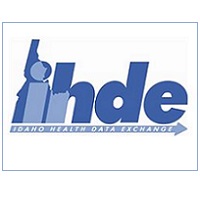 The Idaho Health Data Exchange (IHDE) and UHIN (@UHIN_HIE), the state-designated health information exchange (HIE) in Utah, have connected to exchange admission, discharge and transfer (ADT) notifications for patients who live in one of the states but have a medical encounter in the other state. These initial queries from HIE to HIE are based on the patient’s home zip code, and allow primary care physicians to better coordinate care no matter where the care occurs.
The Idaho Health Data Exchange (IHDE) and UHIN (@UHIN_HIE), the state-designated health information exchange (HIE) in Utah, have connected to exchange admission, discharge and transfer (ADT) notifications for patients who live in one of the states but have a medical encounter in the other state. These initial queries from HIE to HIE are based on the patient’s home zip code, and allow primary care physicians to better coordinate care no matter where the care occurs.
The IHDE-UHIN connection is the latest in a growing HIE-to-HIE hub expanding across the West. Known as the Patient Centered Data Home™ (PCDH), and spearheaded by the Strategic Health Information Exchange Collaborative (SHIEC), the hub allows data to be exchanged across six western states. Through the connection with UHIN, Idahoans experiencing a medical event in Arizona, Nevada, Nebraska or western Colorado will have their data sent to their primary care physician in Idaho.
“I am so excited that the IHDE and UHIN are connected,” said Dr. Boyd Southwick, DO, Family First Medical Center, Idaho Falls. “This will mean so much to me and my patients in the coordination of their care. I have many patients who I refer to the University of Utah Medical Center. The data sharing opportunities that this will allow between me and other providers in Utah who are treating my patients will really enhance treatment and follow-up care. This is a huge step towards progress in patient care activities when patients frequently go across state lines for care.”
How it Works
When a patient living in Idaho receives medical treatment in Utah or one of the other participating states, an alert is sent to IHDE. Primary care physicians participating in the HIE will then receive an ADT notification. The reverse is also true: patients from one of the other five states having a medical encounter in Idaho, will also have their ADT sent from IHDE to their home HIE. Since its inception in spring 2016, the PCDH has exchanged more than 31,000 ADTs.
“The increase of interstate clinical information exchange is an enormous step for IHDE and UHIN to provide access to real-time data that providers in Idaho and Utah can use for patient care,” said Julie Lineberger, Interim Executive Director, IHDE.
There are many reasons patients living in one state seek care across state lines. For some, the nearest hospital may be in a neighboring state or they require specialized care not available locally. Tourism and family relationships can also play a role.
“We’ve known for many years that Idahoans come to Utah for medical treatment,” said Teresa Rivera, President and CEO of UHIN. “Nearly 300,000 residents of Idaho are in UHIN’s Master Patient Index. In the first 20 minutes after the connection began, 30 ADTs were sent between our HIEs.”
Funding for the connection was made available through a supplemental grant awarded to UHIN in 2016 from the Office of the National Coordinator for Health Information Technology (ONC).
About UHIN:
UHIN is a nonprofit coalition of healthcare providers, payers, state government and other stakeholders that have come together to reduce healthcare costs and improve quality and access for the community by enabling providers, payers and patients to exchange information electronically. UHIN focuses on creating electronic exchange solutions that work for the entire healthcare community, from single-provider practices to large integrated healthcare systems.
About the Idaho Health Data Exchange:
The Idaho Health Data Exchange, Inc., a 501(c)(6) non-profit corporation, was established to govern the development and implementation of the health data exchange in Idaho. IHDE is governed by a Board of Directors which provides direction and oversight to the organization. The Board includes representation from both the public and private sectors, including the
health care delivery and financing systems, health care providers and consumers.
The IHDE was created as a result of the efforts of the Health Quality Planning Commission. The Health Quality Planning Commission was created by the 2006 Legislature. The Commission was charged with promoting improved quality of care and health outcomes through investment in health information technology.
Initial funding for the effort was appropriated by Idaho’s Legislature and on-going funding comes from participants in the Exchange.
About SHIEC:
SHIEC is the national trade association of health information exchanges (HIEs) and strategic business and technology partners. Its over 50-member HIE organizations manage and provide for the secure digital exchange of health data for hospitals, healthcare providers and other participants serving more than half of the U.S. patient population. As the unbiased data trustees in their communities, SHIEC member organizations are critical to advancing effective, efficient healthcare delivery locally, regionally and nationally to improve health.
